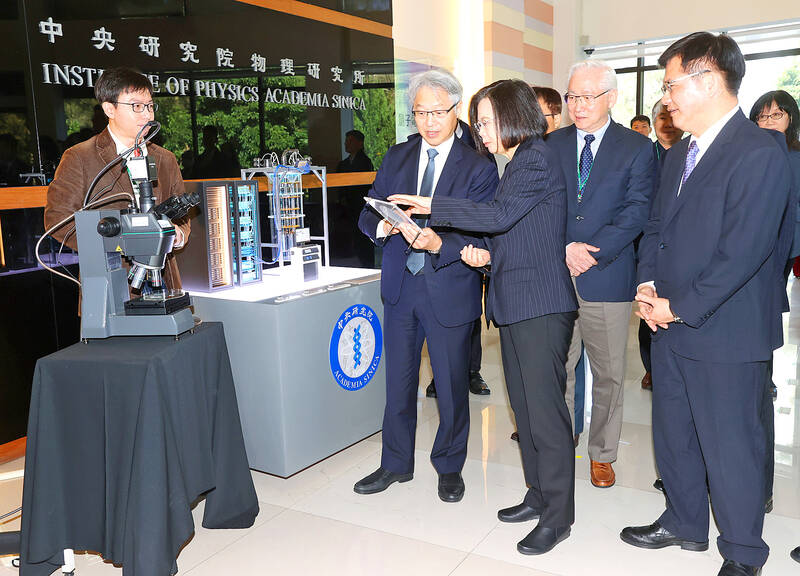A superconducting quantum computer developed and made in Taiwan represents a significant stride in Taiwan’s quantum technology, President Tsai Ing-wen (蔡英文) said yesterday.
Tsai was speaking at a forum organized by Academia Sinica on the progress in research made by its Thematic Center for Quantum Computer.
Lauding the breakthrough as a testament to Taiwan’s prowess in the field, Tsai said the plan was initiated by Academia Sinica more than three years ago.

Photo: CNA
That led to National Tsing Hua University’s development of quantum network coding in May last year, which is expected to boost Taiwan’s capabilities in cybersecurity, national security, finance and biomedicine.
The new computer was developed through a quantum technology project funded by the National Science and Technology Council, Academia Sinica said.
The project came to fruition in October last year when Academia Sinica successfully developed a computer based on 5-quantum-bit (qubit) chips in collaboration with multiple domestic and foreign institutions.
On Jan. 19, the new quantum computer began providing online services to program participants and it is used by developers as a platform for developing complementary metal oxide semiconductor and parametric amplifier technologies, the institution said.
Taiwan is one of the few countries capable of independently producing a superconducting quantum computer, Thematic Center executive officer Chen Chii-dong (陳啟東) said earlier this month.
The research institute initially proposed the idea of developing a superconducting quantum computer in Taiwan in 2019 and has since received government support, Academia Sinica president James Liao (廖俊智) said yesterday.
Tsai pledged to inject additional funding into Academia Sinica’s south branch to support its continued development of quantum computing technologies and efforts to establish a quantum technology industry chain.

Taiwan is to commence mass production of the Tien Kung (天弓, “Sky Bow”) III, IV and V missiles by the second quarter of this year if the legislature approves the government’s NT$1.25 trillion (US$39.78 billion) special defense budget, an official said yesterday. Commenting on condition of anonymity, a defense official with knowledge of the matter said that the advanced systems are expected to provide crucial capabilities against ballistic and cruise missiles for the proposed “T-Dome,” an advanced, multi-layered air defense network. The Tien Kung III is an air defense missile with a maximum interception altitude of 35km. The Tien Kung IV and V

The disruption of 941 flights in and out of Taiwan due to China’s large-scale military exercises was no accident, but rather the result of a “quasi-blockade” used to simulate creating the air and sea routes needed for an amphibious landing, a military expert said. The disruptions occurred on Tuesday and lasted about 10 hours as China conducted live-fire drills in the Taiwan Strait. The Civil Aviation Administration (CAA) said the exercises affected 857 international flights and 84 domestic flights, affecting more than 100,000 travelers. Su Tzu-yun (蘇紫雲), a research fellow at the government-sponsored Institute for National Defense and Security Research, said the air

A strong continental cold air mass is to bring pollutants to Taiwan from tomorrow, the Ministry of Environment said today, as it issued an “orange” air quality alert for most of the country. All of Taiwan except for Hualien and Taitung counties is to be under an “orange” air quality alert tomorrow, indicating air quality that is unhealthy for sensitive groups. In China, areas from Shandong to Shanghai have been enveloped in haze since Saturday, the ministry said in a news release. Yesterday, hourly concentrations of PM2.5 in these areas ranged from 65 to 160 micrograms per cubic meter (mg/m³), and pollutants were

Taiwan’s armed forces have established response protocols for a wide range of sudden contingencies, including the “Wan Chun Plan” to protect the head of state, the Ministry of Defense (MND) said today. After US President Donald Trump on Saturday launched a series of airstrikes in Venezuela and kidnapped Venezuelan President Nicolas Maduro, concerns have been raised as to whether China would launch a similar “decapitation strike” on Taiwan. The armed forces regularly coordinate with relevant agencies and practice drills to ensure preparedness for a wide range of scenarios, Vice Minister of National Defense Hsu Szu-chien (徐斯儉) told reporters before a